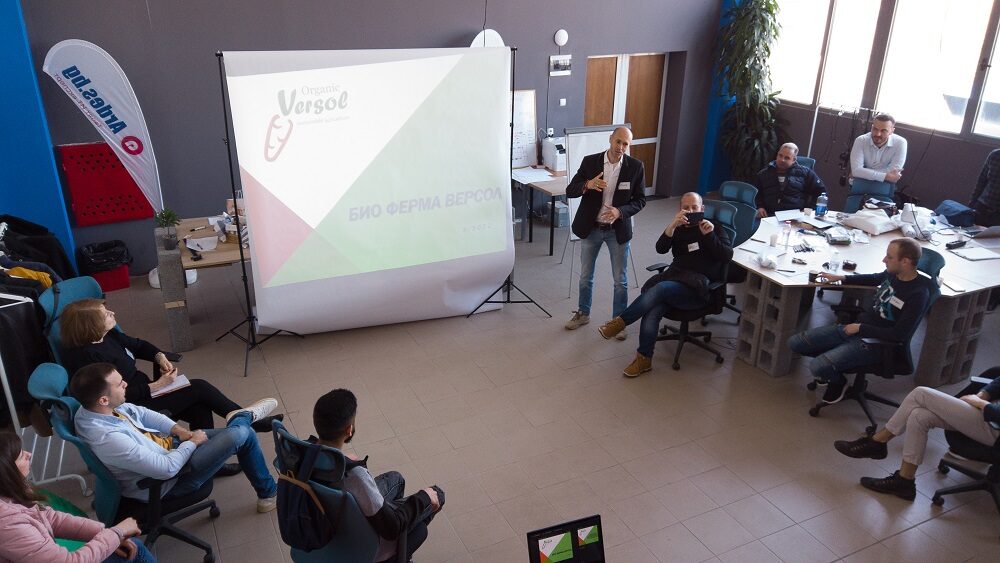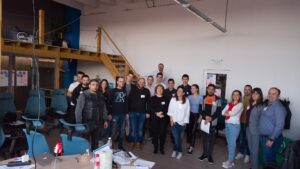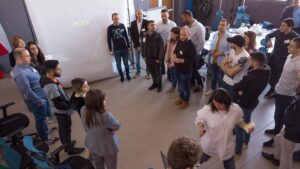
30 Mar Three youth ideas for development of tourism, agriculture and IT sector in Pernik district were born this Saturday
20 young people gathered at the Bash Hub in Pernik, where the first Social Service Jam took place in the district as part of the RAISE Youth project, funded by Iceland, Liechtenstein and Norway through the EEA and Norway Grants Fund for Youth Employment.
The first of the ideas was the creation of an organic farm for the production of honey, fruits and vegetables of local varieties and an e-shop to serve not only locals but also tourists from all over the country. The aim is to offer a quality product to mothers with children, the elderly, and even students in local schools. The idea is also to include a non-agricultural activities to diversify the functionality of the farm, such as on-site visits for tourists, demonstration and training activities and the organization of events for children.
 The youth tourism team focused on the idea of creating an amusement park in the spirit of the popular image of Pernik. Using the jokes about the city, the participants will create a number of attractions for young and old, as well as a space for various events.
The youth tourism team focused on the idea of creating an amusement park in the spirit of the popular image of Pernik. Using the jokes about the city, the participants will create a number of attractions for young and old, as well as a space for various events.
Among the decisions for the development of the region was the creation of an IT company to develop programs and applications for local customers and at a later stage to create an academy where local youth to train and create ready-made staff, which although located in Pernik, to work for clients from all over the world.
The ideas of all these young people became a fact after a number of activities facilitated by Poli Zaharieva, founder of TOM Bulgaria and after the presentation of experienced experts in the field of agriculture, tourism and information technology, namely Bozhura Fidanska, Konstantin Zankov and Kaloyan Velinov. Veselin Despodov – founder of X challenge park Tsarevo, Teodor Kostadinov – co-founder of Vratsa software and Miroslav Peshovski with Versol organic farm also shared their successful practices.
Under the mentorship of the specialists, the participants discovered the strengths and weaknesses of the region, as well as the opportunities and threats to each of the three areas of development. One of their tasks was to define the needs of 10 different types of service users in Pernik district, including mothers with children, the elderly, young people, people with pets, farmers and others. Thus, in developing their ideas, each participant took into account the lack of career development of most people in the region, difficult administrative procedures, lack of interest and communication with local authorities, poor access to healthy food, lack of information for tourists and other interesting activities. , as well as the old material base.
At the end of this colorful, inspiring and fruitful meeting, young people, although separated by different interests – marketing, beekeeping, folk dances, motoring, entrepreneurship, tourism, etc., united around ideas for creating new and different products and they were convinced that every problem has a solution and this solution depends entirely on them.
After the successful presentation of all participants, the RAISE Youth Project Manager – Stanimira Hadjimitova, presented certificates for successful performance to all members of all three teams. She congratulated them for their enthusiasm and encouraged young people to seek support for the realization of their ideas, both by the project team and the team of the Regional Youth RAISE Center – Breznik, to be true visionaries and together to achieve good results! The RAISE Youth project, implemented by the Center for Development of Sustainable Communities, covers over 500 young people aged between 18 and 29, living in the municipalities of Pernik, Breznik, Trun, Radomir, Zemen and Kovachevtsi, who are not currently involved. Within its framework, various trainings for career and personal development are passed, and the most active 20 participants will be provided with additional training and mentoring assistance to start their own business.
The RAISE Youth project, implemented by the Center for Development of Sustainable Communities, covers over 500 young people aged between 18 and 29, living in the municipalities of Pernik, Breznik, Trun, Radomir, Zemen and Kovachevtsi, who are not currently involved. Within its framework, various trainings for career and personal development are passed, and the most active 20 participants will be provided with additional training and mentoring assistance to start their own business.
The RAISE Youth project is funded by Iceland, Liechtenstein and Norway through the EEA and Norway Grants Fund for Youth Employment.

